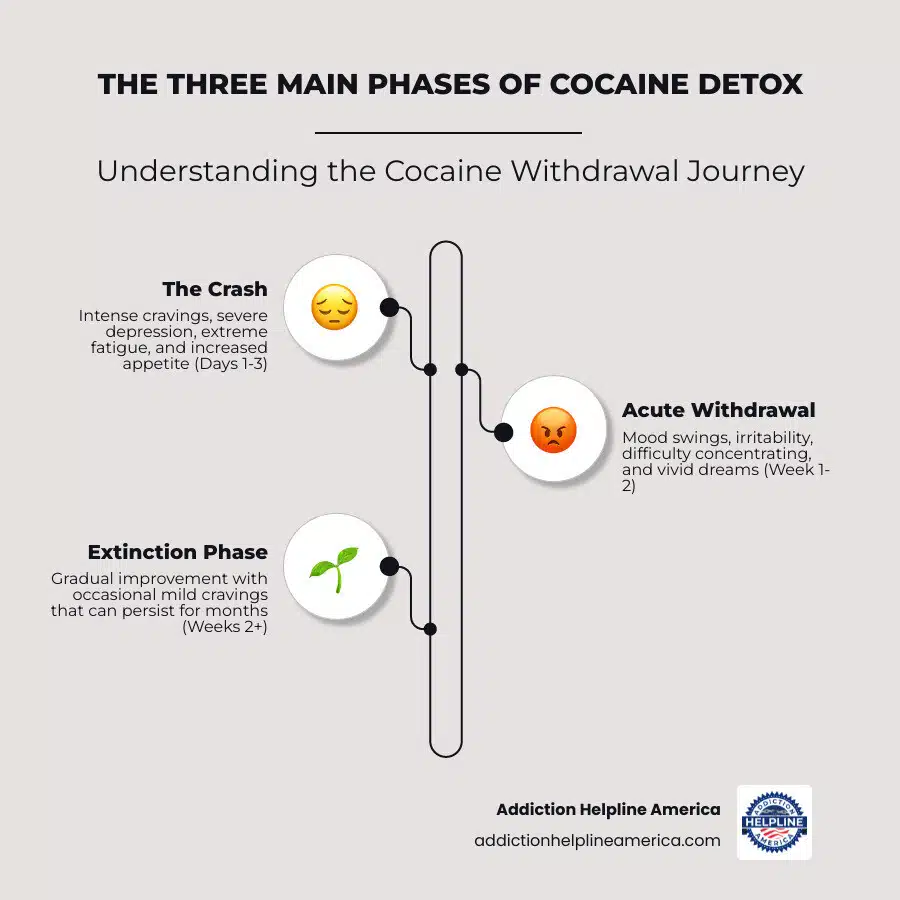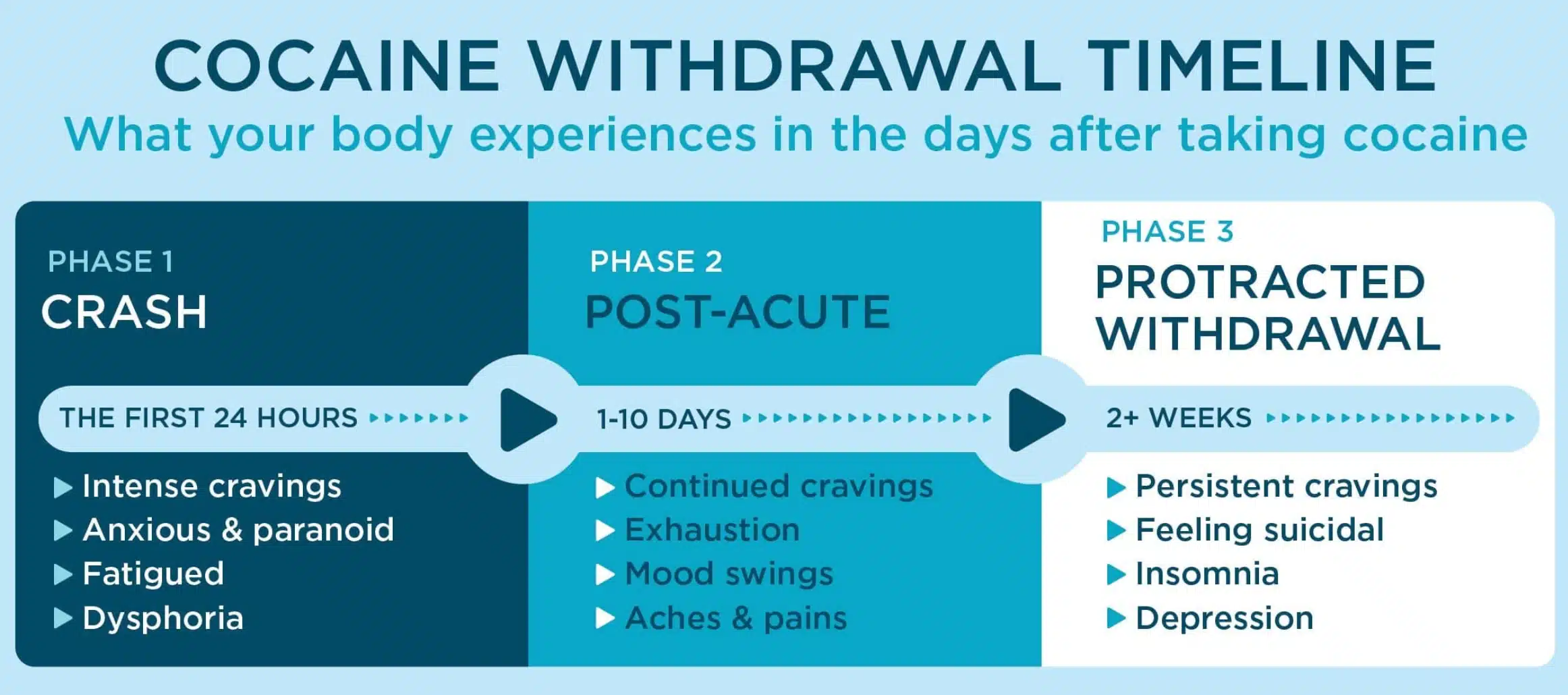Cocaine Detox is the critical first step in overcoming cocaine addiction. The process typically lasts 5-10 days, with symptoms peaking 48-72 hours after the last use. Understanding what to expect can make the journey less frightening and prepare you for success.
The Three Main Phases of Cocaine Detox:
Key Safety Consideration: While not typically life-threatening like alcohol withdrawal, the severe psychological symptoms of cocaine withdrawal—including depression and suicidal thoughts—make professional support essential for safety.
Cocaine alters the brain’s reward system by flooding it with dopamine. When you stop using, your brain needs time to rebalance, which causes withdrawal symptoms. The severity depends on factors like usage history and overall health.
Cocaine addiction is a global issue, with an estimated 19,447 related deaths in the U.S. in 2020 alone. These statistics highlight the urgent need for effective support.
At Addiction Helpline America, we guide individuals and families through the detox process, connecting them with resources to address both the physical and psychological challenges of withdrawal. With the right support, recovery is within reach.

Cocaine is a powerful stimulant that hijacks the brain’s reward system. It creates an intense high by flooding the brain with dopamine, the chemical associated with pleasure. According to the National Institute on Drug Abuse, this surge rewires brain circuits controlling motivation. The brain adapts by becoming less sensitive to dopamine, leading to tolerance (needing more of the drug for the same effect) and dependence (needing the drug to feel normal).
This intense psychological addiction can develop rapidly. In 2021, approximately 4.8 million Americans used cocaine, and 24,486 died from related overdoses. These numbers underscore why Cocaine Detox is a life-saving intervention that allows the brain to heal.
Recognizing the signs of cocaine addiction is the first step toward getting help. If you see these patterns, it’s time to seek professional support for Cocaine Detox and treatment:
Withdrawal occurs because the brain, rewired to function with cocaine, must readjust to its absence. The sudden stop of the drug ends the artificial dopamine surges, leaving the brain’s reward system depleted. This neurotransmitter imbalance is the cause of the withdrawal “crash.”
The primary symptoms are psychological: crushing depression, exhaustion, and intense cravings. The mental and emotional toll is debilitating and dangerous. Without support during Cocaine Detox, the urge to use again to escape these feelings can be overwhelming, making professional help crucial for a successful recovery.
Knowing the Cocaine Detox timeline can help you prepare for what’s ahead. While experiences vary, withdrawal follows a general pattern. The acute phase typically lasts 1-3 weeks, with the most difficult symptoms peaking within 48 to 72 hours after the last use. For many, acute symptoms resolve in 5 to 10 days, but some effects can linger for months in what is known as Post-Acute Withdrawal Syndrome (PAWS).

Take the first step towards a healthier life! Call now to connect with our compassionate team and start your recovery journey today. Your path to healing awaits!
Our recovery specialists are available 24/7 to provide support, and all calls are confidential and free. Reach out anytime – we’re here to help!

This is the most intense phase of detox, beginning 12-24 hours after the last dose. Symptoms include:
As the crash subsides, symptoms shift. While the intensity may ease, challenges remain:
While acute symptoms fade, some psychological effects can persist for months. Key challenges include:
At Addiction Helpline America, we understand these challenges and can connect you with support to steer each phase safely.
Every Cocaine Detox journey is unique, and the severity and duration of withdrawal symptoms depend on several factors. Understanding these variables helps us at Addiction Helpline America connect you with the right level of support for your specific needs.

The intensity of your withdrawal is shaped by your history with cocaine:
Addiction doesn’t exist in a vacuum. Your life experiences play a significant role in your recovery journey.
This is why a holistic approach is essential. Cocaine Detox should address the whole person—your physical and mental health, trauma history, and social environment.
Choosing how to approach Cocaine Detox is a critical decision. While detoxing at home may seem appealing, the psychological intensity of cocaine withdrawal makes professional support essential for safety and success. Medically supervised detox significantly increases the likelihood of completing the process and moving toward long-term recovery.
At Addiction Helpline America, we help you understand your options and connect you with the level of care that matches your needs, prioritizing your safety above all.
Attempting Cocaine Detox alone is dangerous. The primary risks include:
A professional detox program provides a safe, structured start to your healing journey. A typical program lasts 7-10 days and includes:
Currently, there are no FDA-approved medications specifically for Cocaine Detox. However, this does not mean medication is useless. Healthcare professionals can provide symptomatic relief to make the process more tolerable:
Professional supervision is crucial. All medications must be prescribed and monitored by a medical team to ensure safety, prevent drug interactions, and avoid new dependencies. The goal is to stabilize you so you can engage in the next phase of recovery.
Completing Cocaine Detox is a monumental first step, but it’s just the beginning. Recovery is the long-term process of building a new life without cocaine. It involves learning new coping skills and creating a future where you can thrive.

Take the first step towards a healthier life! Call now to connect with our compassionate team and start your recovery journey today. Your path to healing awaits!
Our recovery specialists are available 24/7 to provide support, and all calls are confidential and free. Reach out anytime – we’re here to help!

Because cocaine addiction is primarily psychological, therapy is essential for rewiring the brain in healthier ways. Effective approaches include:
Building a strong support network is crucial for long-term sobriety.
Success in recovery is built on intentional effort. Key strategies include:
When considering Cocaine Detox, many questions arise. Here are clear, honest answers to some of the most common concerns.
The detection window for cocaine varies by the type of test and frequency of use:
Metabolism differs from person to person, so these are general guidelines.
While Cocaine Detox is not typically life-threatening in the way alcohol withdrawal can be (e.g., causing seizures), it is not safe to undergo alone. The primary dangers are psychological and medical:
Due to these risks, professional supervision is essential for safety.
We strongly discourage attempting Cocaine Detox on your own. The process is incredibly difficult and risky without professional help for several reasons:
Professional support from a service like Addiction Helpline America isn’t a sign of weakness; it’s the smartest and safest way to begin your recovery journey.
Taking the step towards Cocaine Detox is a brave and life-changing decision. We’ve explored the complex effects of cocaine on the brain, the challenging but manageable withdrawal timeline, the crucial factors influencing your experience, and the absolute necessity of professional support. You don’t have to steer this alone.
Recovery is not just about detox; it’s a long-term process of healing, learning, and rebuilding. But with the right guidance and support, a cocaine-free life is not just a dream—it’s an achievable reality.
At Addiction Helpline America, we are here to provide free, confidential, and personalized guidance to help you find the right recovery program from our vast network of addiction and mental health treatment centers nationwide. We believe in your potential for a healthier, happier future.
Your first step towards a cocaine-free life begins now. Let us help you find the support you deserve. Find a personalized recovery program today.
Are you or a loved one struggling with addiction? Call today to speak to a treatment expert.
For anyone seeking help for addiction for themselves or a loved one calls to Addiction Helpline America are completely confidential and available 24/7.
Please note: any treatment center listed on our site that receives calls is a paid advertiser.
Calls to a specific treatment center’s listing will be connected directly to that center.
Calls to our general helpline will be answered by treatment providers, all of whom are paid advertisers.
By calling the helpline, you agree to our terms and conditions. These calls are free of charge and carry no obligation to enter treatment. Neither Sober Steps nor anyone answering your call receives a commission or fee based on your choice of treatment provider.
If you’d like to explore additional treatment options or connect with a specific rehab center, you can browse our top-rated listings, visit our homepage, or call us at (844) 561-0606. You may also contact us for further assistance.
Calls to any general helpline will be answered or returned by one of the treatment providers listed, each of which is a paid advertiser:
Our helpline is available 24 hours a day, 7 days a week at no cost to you and with no obligation for you to enter into treatment. We are committed to providing support and guidance whenever you need it.
In some cases, Addiction Helpline America charges our verified partner a modest cost per call. This fee helps us cover the costs of building and maintaining our website, ensuring that we can continue to offer this valuable service to those in need.